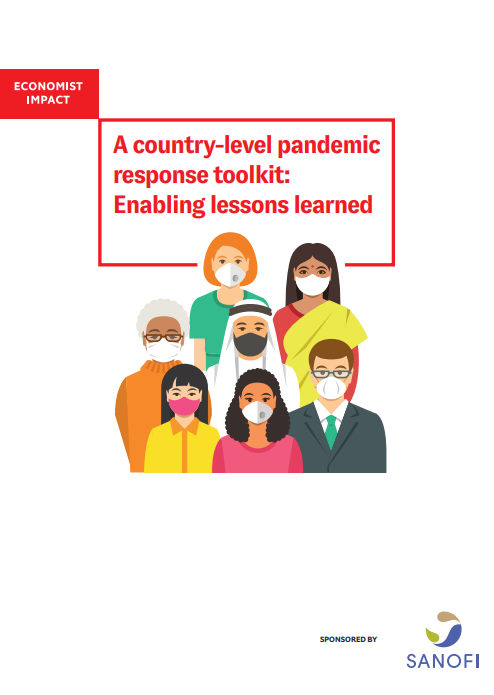 |
 |
| Download whitepaper | Download short version |
This Economist Impact report contributes to the global effort to learn lessons from covid-19 by exploring responses to the pandemic in twelve selected countries: Australia, Canada, Chile, Denmark, Germany, Israel, New Zealand, Portugal, South Korea, Taiwan, United Arab Emirates and the United States.
The covid-19 response within these countries was analysed to identify interesting and successful aspects of their response that others could learn from. Economist Impact convened an Advisory Panel of nine international experts, who provided feedback on our research, advised on practical considerations and identified aspects of response that were suboptimal or missing during covid-19 and how these could be addressed in future pandemic responses.
Based on our country research and expert insights, we created a country-level pandemic response toolkit.
Toolkit structure overview:
- National response (government, public health system, healthcare system – public & private sector)
- Coordination within and outside government
- Evidence-based coordination
- Coordination of response capacity
- Support measures
- Communication and community engagement
- National contribution to the international response
- Coordination
The toolkit is designed to work across a range of different countries and is adaptable to suit an individual country’s needs and priorities when using the toolkit to create a country-level implementation roadmap. The toolkit also highlights the stakeholders involved and includes policy exemplars that demonstrate the implementation of the toolkit element.
Economist Impact’s analysis has shown the value of response elements that have been implemented during covid-19, such as the redeploying and reconfiguring of existing infrastructure, employing a visibly science-led approach and building public trust. Additionally, we have also identified where the response could be improved in future; for example, through strengthening the role of international organisations like the World Health Organization and considering equity and access issues to diagnostics, treatment and vaccination. Together, these elements provide the building blocks to improve the global and national-level response to future pandemics.
The next steps require the humility to learn difficult lessons, the vision to imagine and implement improved response measures, and a financial and political commitment to make for a better response next time.





